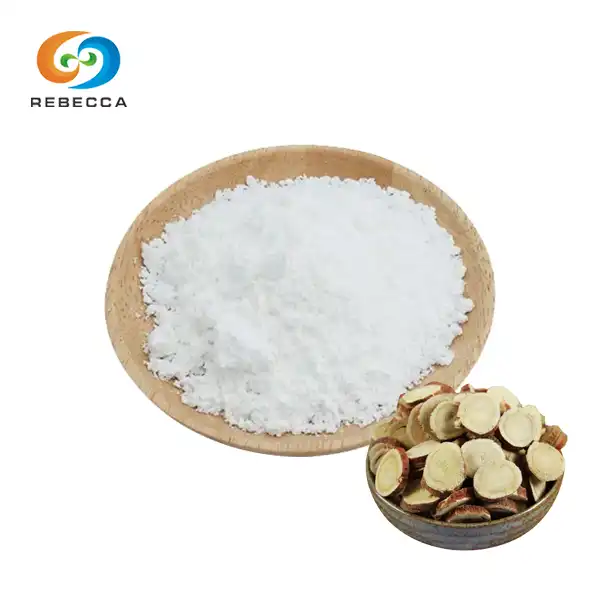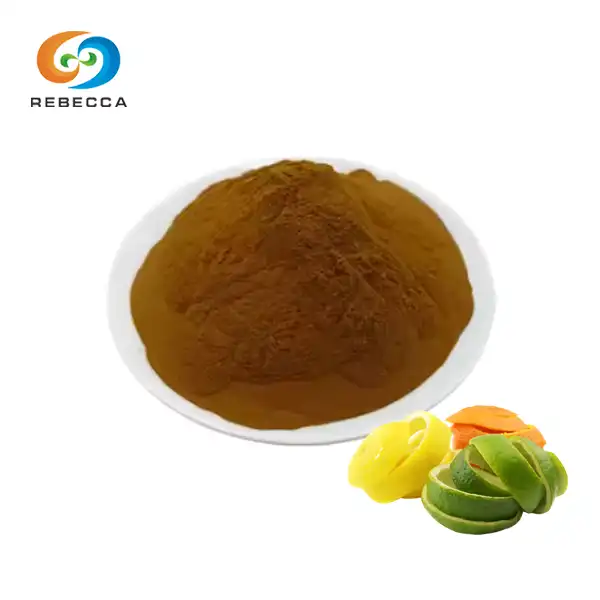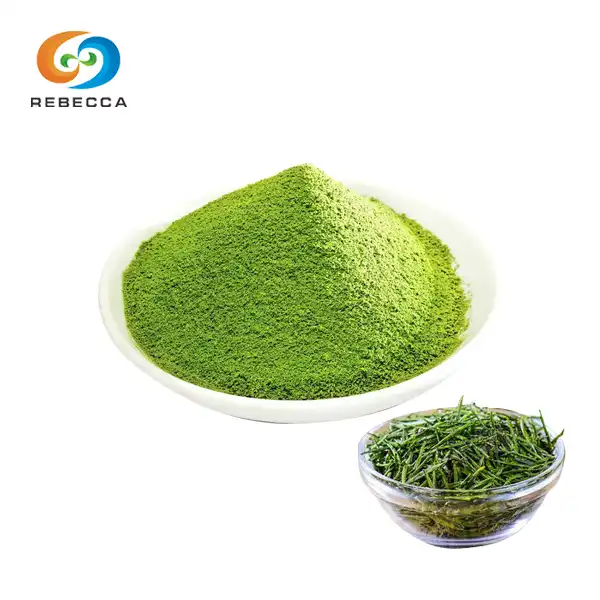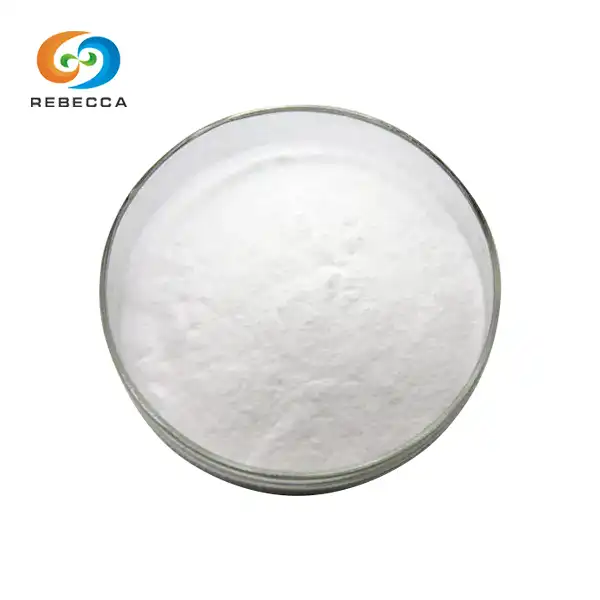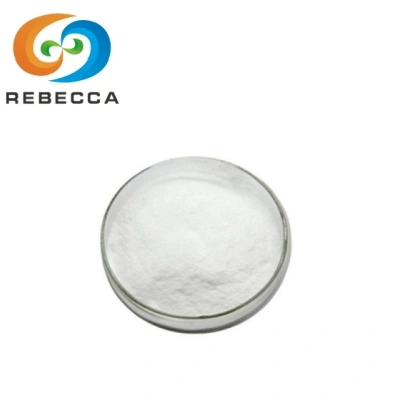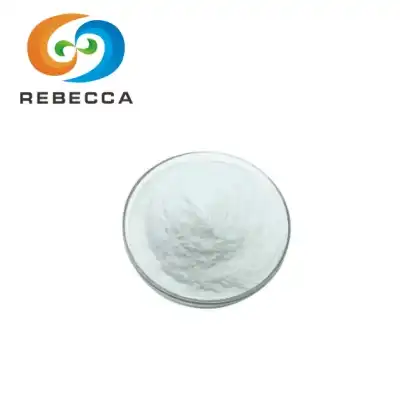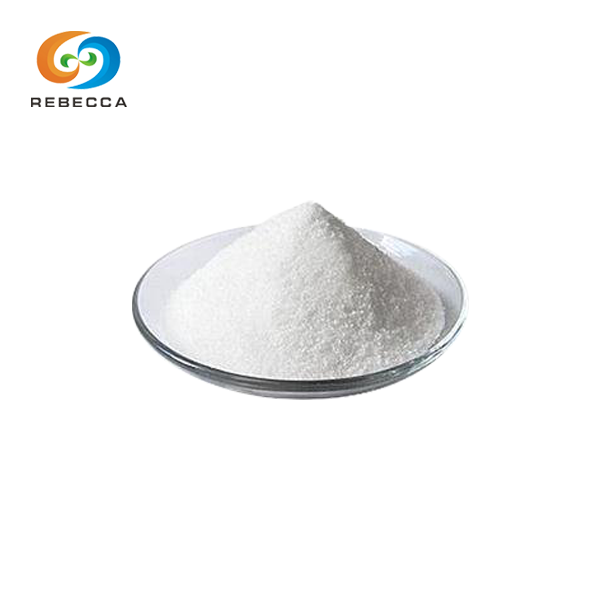Is aloe vera extract good for skin?
Aloe vera, a succulent plant species of the genus Aloe, has been revered for centuries due to its remarkable healing properties. But is aloe vera extract truly beneficial for your skin? Let's dive into the science behind this natural wonder and explore its potential to transform your skincare routine.
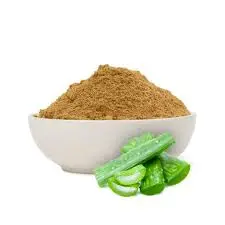
Aloe Vera Extract Powder
Product Name: Aloe Vera Extract
Appearance: Green brown fine powder
Specification: Aloin 20%,Aloin 10%
Test Method: HPLC
CAS No: 1415-73-2
Particle Size: 80 Mesh
Scientific Benefits of Aloe Vera for Skin Health
Aloe vera extract is more than just a trendy ingredient in skincare products. Its efficacy is rooted in scientific evidence, making it a powerhouse for skin health. Here's what research tells us about the benefits of aloe vera extract:
1. Moisturizing Properties: Aloe vera is a natural humectant, meaning it helps retain moisture in the skin. A study published in the Journal of Dermatological Treatment found that aloe vera gel significantly improved skin hydration when used as a moisturizer.
2. Anti-inflammatory Effects: The anti-inflammatory properties of aloe vera can help soothe irritated skin. Research in the International Journal of Molecular Sciences highlights aloe vera's ability to reduce skin inflammation, making it beneficial for conditions like eczema and psoriasis.
3. Wound Healing: Aloe vera has been shown to accelerate wound healing. A review in the Journal of Clinical and Aesthetic Dermatology noted that aloe vera could increase collagen production and enhance the skin's healing process.
4. Antioxidant Protection: Rich in antioxidants like vitamins C and E, aloe vera helps protect the skin from free radical damage. This can slow down the aging process and prevent the formation of fine lines and wrinkles.
5. Acne-fighting Abilities: The antimicrobial properties of aloe vera make it effective against acne-causing bacteria. A study in the Journal of Dermatological Treatment found that aloe vera gel, when combined with tretinoin, was more effective in treating acne than tretinoin alone.
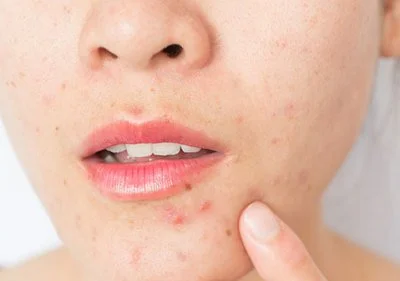
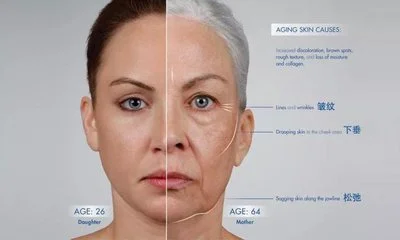
Skin Types That Benefit Most from Aloe Vera
While aloe vera extract is generally beneficial for all skin types, some skin conditions may reap more rewards from its use:
Dry Skin: The moisturizing properties of aloe vera can provide much-needed hydration to dry, flaky skin. Its ability to lock in moisture makes it an excellent natural remedy for those struggling with dry skin conditions.
Sensitive Skin: Thanks to its anti-inflammatory properties, aloe vera can be particularly soothing for sensitive skin. It can help calm redness and irritation, making it a gentle alternative to harsher skincare ingredients.
Oily and Acne-Prone Skin: Contrary to popular belief, oily skin can benefit from aloe vera too. Its lightweight, non-greasy nature helps moisturize without clogging pores. Moreover, its antibacterial properties can help combat acne-causing bacteria.
Aging Skin: The antioxidant content in aloe vera can help fight signs of aging. It may help reduce the appearance of fine lines and wrinkles while improving overall skin elasticity.
Sun-Damaged Skin: Aloe vera's cooling and healing properties make it excellent for soothing sunburns. It can help repair sun damage and may even have some photoprotective effects.
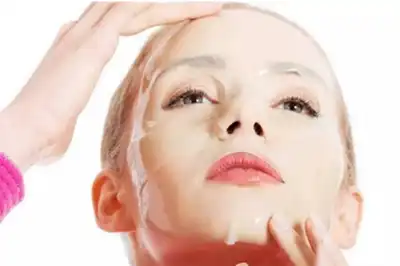
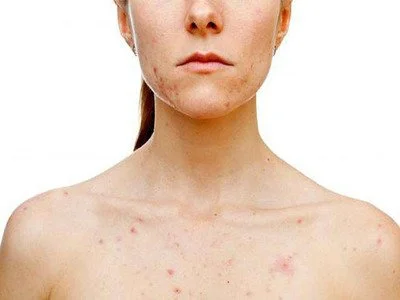
How to Safely Apply Aloe Vera Extract Daily?
Incorporating aloe vera extract into your daily skincare routine can be simple and effective. Here's a step-by-step guide to help you make the most of this natural skin savior:
1. Choose the Right Product: Look for high-quality aloe vera extract or gel with a high concentration of aloe vera. Products like those offered by Rebecca Bio-Tech ensure you're getting pure, potent aloe vera extract.
2. Cleanse Your Skin: Always start with clean skin. Use a gentle cleanser suitable for your skin type to remove any dirt, oil, or makeup.
3. Apply a Thin Layer: Using clean fingers or a cotton pad, apply a thin layer of aloe vera extract to your face and neck. Be gentle and avoid the sensitive eye area.
4. Allow It to Absorb: Give the aloe vera extract a few minutes to absorb into your skin before applying other products.
5. Follow with Moisturizer: If you have particularly dry skin, you may want to follow up with a light moisturizer to lock in the benefits of the aloe vera.
6. Use Sunscreen: If applying in the morning, always follow up with a broad-spectrum sunscreen to protect your skin from UV damage.
7. Patch Test First: Before incorporating aloe vera extract into your routine, do a patch test on a small area of skin to ensure you don't have any adverse reactions.
Remember, consistency is key. For best results, incorporate aloe vera extract into both your morning and evening skincare routines.
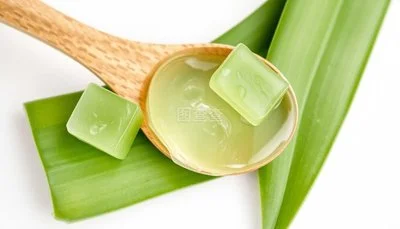
Aloe Vera Extract Supplier: Rebecca Bio-Tech
When it comes to harnessing the power of aloe vera for your skin, quality matters. Rebecca Bio-Tech stands out as a leading supplier of premium aloe vera extract. Their aloe vera extract powder, with its high concentration of aloin (available in 10% and 20% specifications), offers potent skincare benefits.
Rebecca Bio-Tech's commitment to quality is evident in their meticulous production process. Their product is carefully processed to retain maximum efficacy, ensuring you get the full spectrum of skin-loving benefits. Whether you're a skincare enthusiast looking to elevate your routine or a manufacturer seeking high-quality ingredients, Rebecca Bio-Tech's plant extract is an excellent choice.
Reach out to Rebecca Bio-Tech at information@sxrebecca.com to learn more about their products and how they can benefit your skin or your skincare line.
FAQ
Q1: Can aloe vera extract help with acne scars?
A: Yes, aloe vera extract can potentially help with acne scars. Its natural anti-inflammatory properties can help reduce redness and swelling associated with acne. Additionally, aloe vera contains compounds that may promote skin cell turnover and collagen production, which can aid in the healing of acne scars over time. However, for severe scarring, it's best to consult with a dermatologist for more targeted treatments.
Q2: How often should I use aloe vera extract on my skin?
A: For most people, it's safe to use aloe vera extract on the skin daily. You can incorporate it into both your morning and evening skincare routines. However, if you have sensitive skin or are using other active ingredients, you might want to start with once-daily application and gradually increase as your skin adjusts. Always perform a patch test before regular use and discontinue if you experience any irritation.
Q3: Can aloe vera extract replace my regular moisturizer?
A: While aloe vera extract has excellent moisturizing properties, whether it can completely replace your regular moisturizer depends on your skin type and needs. For those with oily or combination skin, aloe vera extract might provide sufficient hydration. However, if you have dry or mature skin, you might need to use aloe vera in conjunction with a more occlusive moisturizer to lock in hydration. Experiment to find what works best for your skin.
References
- Surjushe, A., Vasani, R., & Saple, D. G. (2008). Aloe vera: a short review. Indian journal of dermatology, 53(4), 163-166.
- Hekmatpou, D., Mehrabi, F., Rahzani, K., & Aminiyan, A. (2019). The effect of Aloe Vera Clinical Trials on Prevention and Healing of Skin Wound: A Systematic Review. Iranian journal of medical sciences, 44(1), 1-9.
- Radha, M. H., & Laxmipriya, N. P. (2015). Evaluation of biological properties and clinical effectiveness of Aloe vera: A systematic review. Journal of traditional and complementary medicine, 5(1), 21-26.
- Nejatzadeh-Barandozi, F. (2013). Antibacterial activities and antioxidant capacity of Aloe vera. Organic and medicinal chemistry letters, 3(1), 5.
- Choi, S., & Chung, M. H. (2003). A review on the relationship between Aloe vera components and their biologic effects. Seminars in integrative medicine, 1(1), 53-62.
